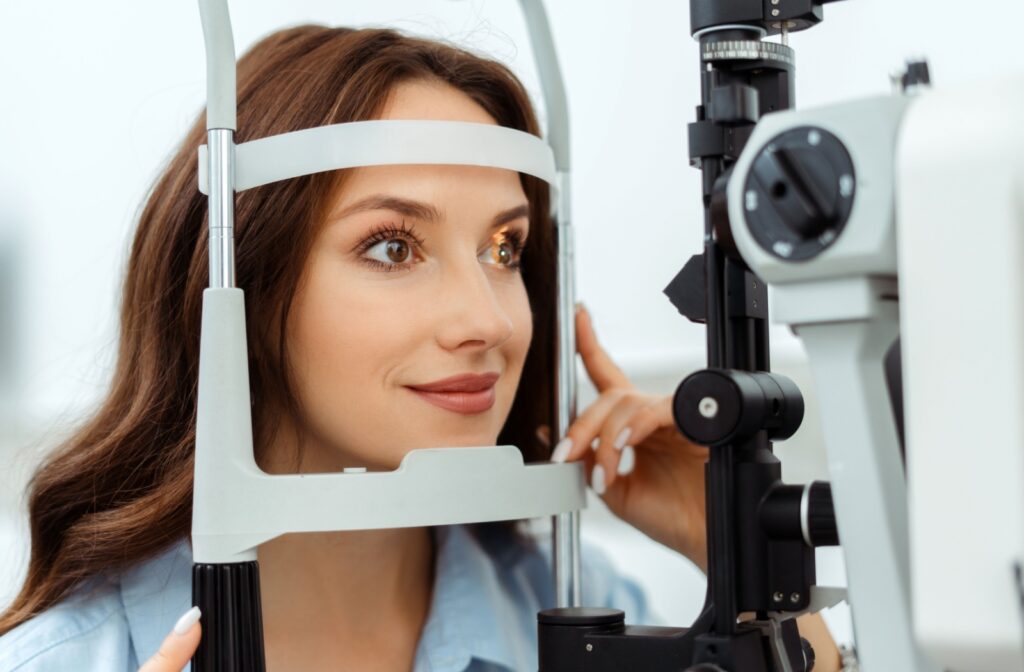Most people wait until something feels off with their vision to book an eye exam. But eye care is not just about seeing clearly, it is about being proactive, staying ahead of problems that could affect your health long before symptoms appear.
A comprehensive eye exam checks more than just your prescription. They help detect early signs of eye disease and even conditions like diabetes or high blood pressure. Comprehensive exams are a simple but important way to protect both your vision and your overall health over time.
Why Comprehensive Eye Exams Matter
A comprehensive eye exam evaluates both your vision clarity and overall eye health. This detailed assessment allows your optometrist to detect potential problems early, when treatment is most effective. Many serious eye conditions develop gradually without noticeable symptoms in their early stages. By the time you notice vision changes, significant damage may have already occurred.
Early Detection Saves Vision
Conditions like glaucoma, macular degeneration, and diabetic retinopathy often progress silently. For example, glaucoma can cause irreversible vision loss before you notice any symptoms. Regular comprehensive eye exams help your optometrist to detect elevated eye pressure and other early warning signs, enabling timely intervention to help preserve your vision.
Window to Your Overall Health
Your eyes provide unique insights into your systemic health. During a comprehensive eye exam, your optometrist can identify signs of diabetes, high blood pressure, cardiovascular disease, and certain autoimmune conditions. The blood vessels in your retina are the only place in your body where blood vessels can be directly observed without invasive procedures.
Supporting Children’s Development
For children, clear vision plays a role in learning and social development. Undiagnosed vision problems can affect academic performance, sports participation, and self-confidence. Children often don’t realize their vision isn’t normal, making regular eye exams beneficial for identifying and correcting issues early.
How Often Should You Schedule Eye Exams?
The frequency of comprehensive eye exams depends on your age, risk factors, and overall eye health. According to the American Optometric Association:
Children & Adolescents
- First eye exam between 6 and 12 months of age
- At least one exam between ages 3 and 5
- Annual exams starting before first grade and continuing through age 18
Adults (18-64 Years)
- At least every two years
- Annually if you wear corrective lenses especially contact lenses or have risk factors like diabetes, high blood pressure, or a family history of eye disease
Adults 65 & Olders
- Annual comprehensive eye exams are recommended to monitor age-related changes and detect conditions like glaucoma, cataracts, and macular degeneration
Higher-Risk Individuals
More frequent exams may be needed for people with certain medical conditions, a family history of eye disease, or those taking medications that affect the eyes. Children with special needs or adults wearing specialty contact lenses may also require more frequent monitoring.
Regular eye exams are recommended at every stage of life to protect vision, support overall health, and catch issues early when they are most treatable.
What Might Happen During a Comprehensive Eye Exam

Knowing what happens during your visit can help you feel more comfortable and prepared. A comprehensive eye exam typically involves several components, each providing important information about your vision and eye health.
Pre-Exam Discussion
Your exam begins with a discussion about your health history, current medications, and any vision concerns. This information helps your optometrist understand your individual risk factors and tailor the examination accordingly.
If you wear glasses or contact lenses, bring them to your appointment. This allows your optometrist to assess how well your current prescription is working and identify any needed changes.
Initial Testing
Before meeting with your optometrist, a technician will perform several baseline measurements:
- Tonometry measures the pressure inside your eyes using a gentle air puff or other methods. Elevated eye pressure can indicate glaucoma risk, making this test an important screening tool.
- Autorefraction provides an initial estimate of your vision prescription, giving your optometrist a starting point for the detailed vision assessment.
- Retinal photography captures detailed images of your retina, optic nerve, and macula. These images serve as a baseline for future comparisons and help detect subtle changes over time.
Vision Testing
Your optometrist will conduct detailed vision testing to determine how clearly you see at various distances. This includes the familiar eye chart test as well as more sophisticated measurements to determine your exact prescription needs. The refraction test generally involves looking through different lens combinations while reading letters or symbols.
Eye Health Assessment
Using specialized instruments like a slit lamp and ophthalmoscope, your optometrist examines the structures of your eyes in detail. This examination evaluates your cornea, lens, retina, optic nerve, and other important structures.
Your optometrist may use dilating eye drops to get a better view of your retina and optic nerve. These drops temporarily enlarge your pupils, allowing a more thorough examination of the back of your eye.
Results & Recommendations
After completing all tests, your optometrist will discuss the findings with you in detail. They’ll explain any changes in your vision or eye health and recommend appropriate treatment or management strategies.
If you need corrective lenses, your optometrist will discuss the best options for your lifestyle and visual needs. They may also recommend specific treatments for dry eye, digital eye strain, or other conditions identified during the exam.
Book Your Exam Today
A comprehensive exam at Precision Eye Care gives you a clear picture of your vision and eye health. By identifying issues early, we help protect your sight and overall well-being.
Regular exams are a key part of lifelong vision care. Book an appointment with Precision Eye Care in Vancouver, Washington, and let our team support your vision with expert, personalized care.





